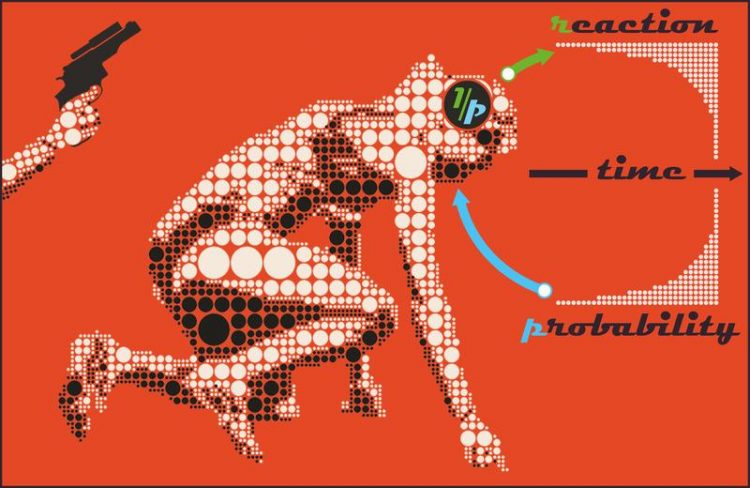The Anticipation of Events in Time

The reaction time to a stochastic event is proportional to the reciprocal of its probability Figure by Georgios Michalareas
How does the brain learn when an event is more probable to happen?
It has been a long-standing question how the brain represents probabilities across time. The main candidate mechanism to date has been the computation of Hazard Rate, i.e., the probability that an event is about to happen given that it has not happened already.
In their article in Nature Communications, Matthias Grabenhorst, Georgios Michalareas and other reasearchers demonstrate with behavioral experiments that the brain uses a much simpler computation instead—it just estimates the reciprocal of probability.
This is a fundamental finding, shedding light onto a canonical principle of how the brain models probabilities. The close relationship between the reciprocal probability and Shanon information content (also termed Surprisal) hints that the brain actually represents probabilities in terms of information.
“Probability itself is the fundamental parameter used by the brain”, says lead author Matthias Grabenhorst.
A second important finding in this work concerns the uncertainty in estimation of elapsed time. Previous research has demonstrated that the longer the elapsed time, the higher the uncertainty in its estimation by the brain.
Grabenhorst and his colleauges present evidence that this principle of monotonically increasing uncertainty with elapsed time does not always hold.
It is actually the probability distribution of events across time which determines when uncertainty is lowest or highest.
Finally, the authors show that the above findings hold in three different modalities: vision, audition, and somatosensation.
This commonality hints to either a central mechanism used by all three modalities or by a canonical peripheral mechanism employed in multiple sensory areas of the brain.
Dr. med. Matthias Grabenhorst
+49 69 8300479-340
matthias.grabenhorst@ae.mpg.de
Grabenhorst, M., Michalareas, G., Maloney, L. T., & Poeppel, D. (2019). The anticipation of events in time. Nature Communications, 10(1). doi:10.1038/s41467-019-13849-0
Media Contact
More Information:
http://www.ae.mpg.de/All latest news from the category: Health and Medicine
This subject area encompasses research and studies in the field of human medicine.
Among the wide-ranging list of topics covered here are anesthesiology, anatomy, surgery, human genetics, hygiene and environmental medicine, internal medicine, neurology, pharmacology, physiology, urology and dental medicine.
Newest articles

A universal framework for spatial biology
SpatialData is a freely accessible tool to unify and integrate data from different omics technologies accounting for spatial information, which can provide holistic insights into health and disease. Biological processes…

How complex biological processes arise
A $20 million grant from the U.S. National Science Foundation (NSF) will support the establishment and operation of the National Synthesis Center for Emergence in the Molecular and Cellular Sciences (NCEMS) at…

Airborne single-photon lidar system achieves high-resolution 3D imaging
Compact, low-power system opens doors for photon-efficient drone and satellite-based environmental monitoring and mapping. Researchers have developed a compact and lightweight single-photon airborne lidar system that can acquire high-resolution 3D…





















